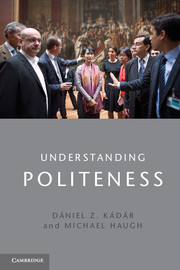Book contents
- Frontmatter
- Contents
- List of figures
- List of tables
- Foreword
- Acknowledgements
- 1 Introduction
- Part I Theoretical framework
- 2 The roots of politeness research
- 3 Recent developments in politeness research
- 4 Politeness as social practice
- 5 Understandings of politeness
- Part II Politeness and time
- Part III Politeness and social space: from mind to society
- Notes
- Glossary
- References
- Index
3 - Recent developments in politeness research
Published online by Cambridge University Press: 05 June 2014
- Frontmatter
- Contents
- List of figures
- List of tables
- Foreword
- Acknowledgements
- 1 Introduction
- Part I Theoretical framework
- 2 The roots of politeness research
- 3 Recent developments in politeness research
- 4 Politeness as social practice
- 5 Understandings of politeness
- Part II Politeness and time
- Part III Politeness and social space: from mind to society
- Notes
- Glossary
- References
- Index
Summary
Introduction
The field of politeness research has increased in scope and diversity since the beginning of the second millennium. In the past decade, certain critical ideas on linguistic politeness which had been latent in the field for some time, such as the importance of making a distinction between lay and technical understandings of politeness, have been combined with a far-reaching methodological shift towards examining politeness situated in discourse and interaction. This methodological shift in politeness research is often referred to in the field as the discursive turn.
It is often argued that the discursive turn started with the publication of Gino Eelen's (2001) A Critique of Politeness Theories, a monograph which in some sense has become as influential as Brown and Levinson (1987) (see Chapter 2). Eelen's (2001) work, in turn, has its roots in an earlier edited collection by Watts, Ide and Konrad Ehlich (1992a). However, while enormously influential amongst politeness researchers, the impact of this work has not yet reached the stature of the first-wave approaches since, as was argued in Chapter 2, thus far no theory has been able to significantly dent the popularity of Brown and Levinson's framework across various disciplines. Furthermore, Eelen did not attempt to elaborate a framework per se, but instead was engaged in a self-reflexive exercise, essentially focusing on a critique of theoretical and methodological issues in the field. Yet while Eelen's book did not, like Brown and Levinson, create a theoretical paradigm for examining politeness, it successfully drew attention to the need to devote greater attention to the participants’ perspective in studying linguistic politeness. This focus on the participant has become a cornerstone in the major body of post-2000 politeness research.
- Type
- Chapter
- Information
- Understanding Politeness , pp. 36 - 56Publisher: Cambridge University PressPrint publication year: 2013



